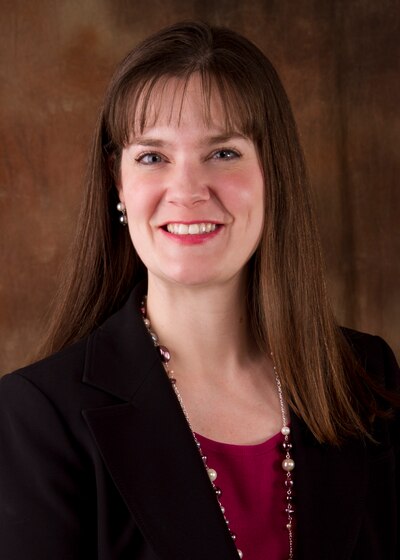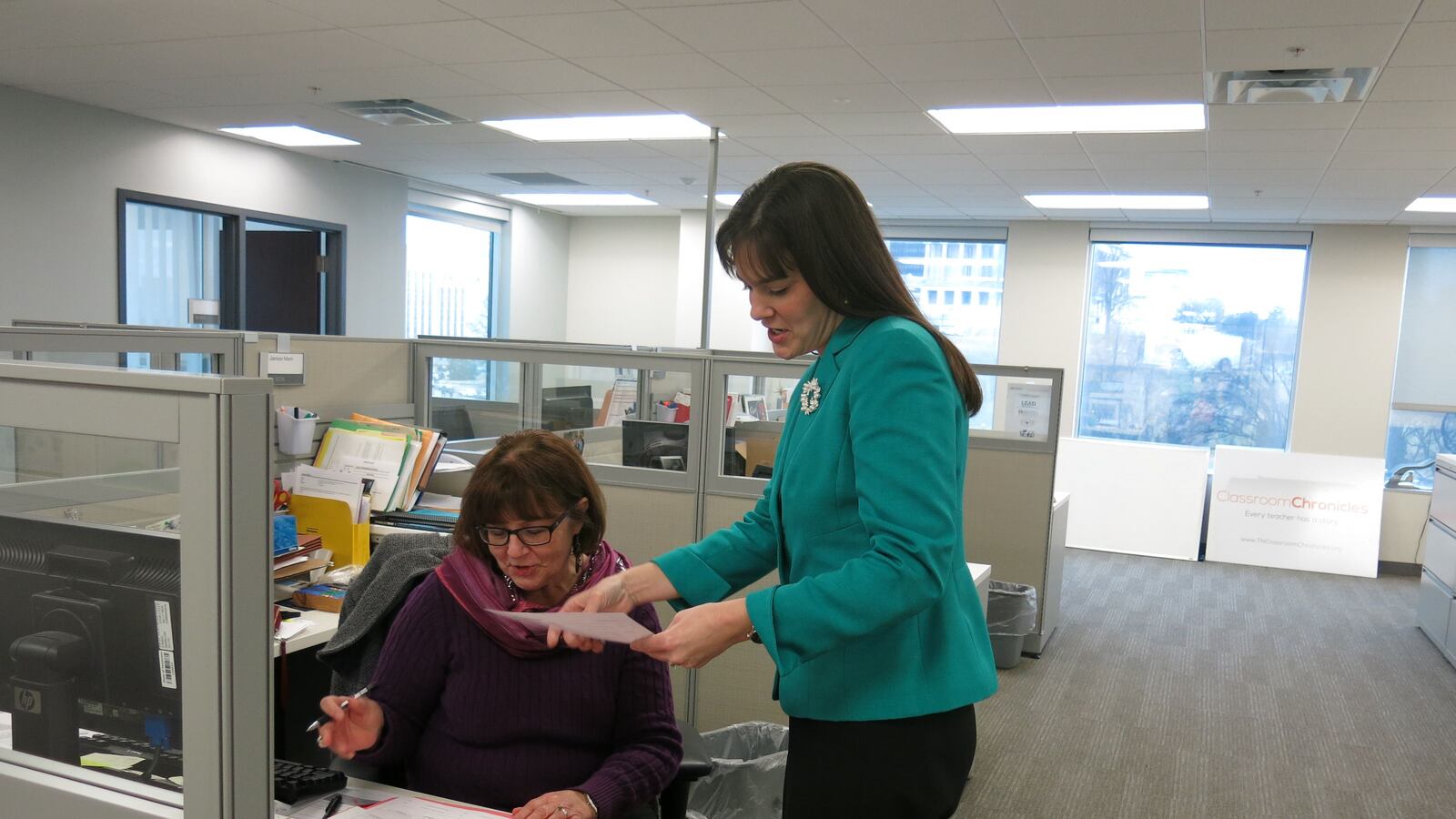Candice McQueen might go down as one of Gov. Bill Haslam’s most popular appointments. Following his announcement in December that he had chosen the Clarksville native as the state’s new education commissioner, all factions of Tennessee’s education community — parents, the teachers union, and pro-school choice advocacy groups — shared their optimism on social media.
McQueen, 40, is a former classroom teacher who has spent most of her career training teachers at Lipscomb University’s College of Education in Nashville. She replaced Kevin Huffman, who implemented sweeping changes during his four-year tenure and became a lightning rod of the education reform movement.
As her first week on the job drew to a close, McQueen spoke with Chalkbeat about her goals as commissioner and the many complex issues awaiting her time and attention. She declined to comment on teacher evaluations and Tennessee’s BEP funding formula, explaining that “I still need more information.” Regarding the ongoing debate in school districts and the legislature on Common Core standards for math and English, she said only that she supports the current review process.
Here are highlights from our Q&A session.
What are your goals for the Tennessee Department of Education?
We want to keep the momentum that we’ve had as a state. As you know, we’ve been the fastest improving state in terms of student achievement, and we have another opportunity this year, as our students are being tested on NAEP (National Assessment of Education Progress) across the state right now. And we have a goal internally that we feel like we could move from the bottom half of all states on NAEP to the top half by 2019, if we stay on the pathway that we’re on.
We also think it’s very important to focus on improving our ACT scores. Currently, our average is 19.3, and we want to move that to 21, which would denote college and career readiness for our students.
How will the department help teachers and students reach those goals?
What you will see from us is additional professional development and training — the leadership training as well as teacher training. We’ve gotten fabulous feedback about the quality – the alignment – of the training that we’re doing to the work that teachers and leaders are doing inside of our districts. We will continue to partner with our CORE (Centers of Regional Excellence) offices. We’ve trained 47,000 teachers through direct training [from the state Education Department], and we’ll be looking for more opportunities to do that, particularly as we prepare for a new assessment [next school year].
Your predecessor said that, with dwindling Race to the Top money, the state must find new ways to pay for its summer training. Will that be a priority?
Summer training will be a priority. We’re looking for ways to continue that with additional funding and reallocation of funding. We believe that training is so important. We have to look for ways to keep it moving.
You mentioned the new assessment. What kinds of conversations are you having about that?
We’re very pleased with the initial partnership work [with Measurement Inc., the company designing TNReady, the state’s new assessment aligning with new state standards]. Our challenge will be to make sure our teachers are ready and our students are ready. To do that, our training will be focused on doing all we can to get teachers, districts, students to be familiar with the types of questions that they will be asked on the new assessment.
Might we see any changes in the Achievement School District, which was created in 2011 to turn around the state’s lowest-performing schools? Do you think the ASD is the best approach to fixing the bottom 5 percent of our schools?
During the last couple of weeks, I’ve begun looking at the data from the Achievement School District and have had great conversations with [Superintendent] Chris Barbic. Over the next couple of months, as we’re looking at moving from the startup phase to a much more sustainable phase, I’m really looking forward to partnering with him and looking at how we move to a sustainable model. I’ve been impressed with the data I have looked at.
With all of the challenges facing Tennessee education today — from low teacher morale to chronically underperforming schools to often contentious debate about the best way to fix what’s broken — what’s the most important message that you as the new state education commissioner would like convey today to Tennessee students, teachers and parents?

Tennessee is on the pathway to be a model for the nation. Teachers have done every single thing they’ve been asked to do. Teachers are certainly a group that needs to be celebrated more. I’ve dedicated my life’s work to working with teachers, and I know how rewarding and challenging the job is on a daily basis. I also know that teachers in Tennessee always rise to what they’re asked to do. That’s their nature. I am dedicated to going across the state this year. I’ll be in every district, and my goal is to be in teachers’ classrooms, seeing what they’re doing, and modeling for them that I appreciate them and that others appreciate them. The work that they’ve been doing is something they’ve had to do fast. They’ve had to rise to new standards and assessments very quickly. I want to personally say thank you to them for doing the work in such an impressive way over a short period of time.
How can we support teachers without raising their salaries?
One of the very best ways to support teachers is to tell them “thank you” more often. The respect level we should have for teachers should be the highest of any profession. They are all things to all people: a counselor, a mentor, sometimes just a shoulder to cry on. They have this fine balance: “I’m going to push you to meet high expactations and love you and care for you.” That’s very difficult to do. Saying thank you should not be underdone. We should do that more often.
Another thing we can do is encourage more people to become teachers. We should be encouraging our most talented high school students and college students to think about teaching. I get very frustrated when I hear someone say, “Oh, you need to go into X profession, and don’t think about teaching because it’s undervalued or underpaid.” Teaching is the most critical profession we have in helping kids succeed in their career experiences, their family experiences, their life experiences. I’m going to look for opportunities to talk to students about the teaching profession, as well as thinking about what teachers do for them, and how they value teachers.
We need to think about better teacher pay, and think about how [the state] can work together with teachers, and be more collaborative. Those are things we can do to encourage people to think better about the profession.
How will you work with teacher preparation programs?
Teacher preparation is certainly an area I have spent my life working in, so it will be a focus. I look forward to working with our teacher profession programs to use the data available to them to continue to look at ways to improve.
Another area is connecting teacher preparation to districts’ needs. I want to look for ways our teacher prep programs can partner and collaborate with districts, so their clinical placements are more associated with the actual needs and desires of the districts that they working with.
So if Henry County needs 10 math teachers, then they would look at the pipeline of where their math teachers are coming from. If they typically only get 5 applicants [for math positions], then they go to X University and say, “Let’s create a partnership where we work together to encourage people to become [math] teachers.” We need the best communciation we can have between a district leader and teacher preparation programs to make sure that what teachers are being prepared to do is actually what’s going on in the field.
Alignment seems to be a common theme here.
Alignment will be a term you will hear from me more often. I’m trying to align the work of the Department of Education with the work in economic development. Are we having students prepared for the workforce? Are we offering students with the skills employers need, plus the soft skills they need to be successful? I’m talking about drive and the character they bring to the workplace. We have to connect to education with the reality out in the field.
EDITOR’S NOTE: Each month, Chalkbeat conducts a Q&A interview with a different leader, innovator, influential thinker or hero across Tennessee’s education community. We invite our readers to email Chalkbeat your suggestions for future subjects to maldrich@chalkbeat.org.
Contact Grace Tatter at gtatter@chalkbeat.org.
Follow us on Twitter: @GraceTatter, @chalkbeattn.
Like us on Facebook.
Sign up for our newsletter for regular updates on Tennessee education news.

